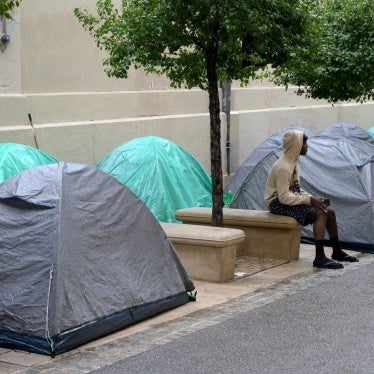Other Central Asian governments should follow the example set by Kazakhstan in resisting pressure from the Uzbek government, Human Rights Watch said today.
On July 12 the government of Kazakhstan took the courageous step of releasing from custody an Uzbek rights defender and witness to the Andijan massacre, Lutfullo Shamsudinov, whose extradition the Uzbek authorities had requested. Dozens of other defenders remain in custody in Uzbekistan, including another Andijan rights activist, Saidjahon Zainabitdinov.
“The government of Kazakhstan has done the right thing and other governments in the region should follow suit,” said Holly Cartner, executive director of Human Rights Watch’s Europe and Central Asia division. “The pressure from Uzbekistan is very intense right now, and standing up to it requires real political will.”
Lutfullo Shamsudinov was an eye-witness to the May 13 massacre in the Uzbek city of Andijan in which government forces killed hundreds of unarmed civilians. He fled Uzbekistan on May 26 fearing persecution and torture at the hands of the authorities. He was recognized as a refugee by the United Nations High Commissioner for Refugees (UNCHR) in Almaty.
On the night of July 4, Kazakh authorities detained Shamsudinov pursuant to an extradition order issued by the government of Uzbekistan. On July 12, Kazakh officials made the decision to turn Shamsudinov and his family over to UNHCR protection and they were flown out of Kazakhstan for resettlement in a safe third country.
UNHCR intervention, and engagement by the European Union and United States, were important in bolstering Kazakhstan’s resistance to the spurious extradition demand and preventing Lutfullo Shamsudinov’s forcible return to Uzbekistan.
Uzbekistan’s security service alleged that Shamsudinov had a mission to “inform his ‘patrons’ about the situation in Andijan and spread misinformation from the scene.” Authorities charged him with “terrorism” and “spreading information with the aim of causing panic.”
The government of Uzbekistan has levied the same charges against fellow Andijan rights defender Saidjahon Zainabitdinov. In the aftermath of the massacre, Zainabitdinov spoke out about the government’s use of force against unarmed civilians. Uzbek authorities arrested him on May 21.
“We are deeply concerned about Saidjahon Zainabitdinov’s safety in Uzbek custody,” said Cartner. “His detention is a blatant act of retaliation against a brave rights defender for telling the truth about the massacre. He should be released immediately.”
Human Rights Watch called on the European Union, United States, and Russia in particular to exert maximum pressure on President Karimov and Uzbek authorities to halt the continued harassment and persecution of Uzbekistan’s human rights defenders, and to immediately release Saidjahon Zainabitdinov.
Dozens of other Uzbek rights defenders have suffered intense persecution in the government crackdown that followed the Andijan killings. Silencing the witnesses has been a particular focus of the government’s cover-up of the massacre. In an effort to block the flow of information to the outside world, Uzbek police and security agents have come down particularly hard on human rights defenders, journalists, and members of the political opposition. Outspoken eyewitnesses and dissidents in Andijan and other parts of Uzbekistan have been detained, beaten, harassed and forced to abandon their work documenting government rights abuses.
“The climate of fear in Uzbekistan today is palpable,” said Cartner. “The international community needs to act fast to save what is left of civil society there.”
With Uzbek rights defenders facing the risk of illegal detention, physical mistreatment and other forms of retaliation for revelations about the government’s role in the Andijan killings, many of the details surrounding the May 13 events remain unknown.
“Only an independent, international investigation into the Andijan massacre can offer the world a full picture of what took place there, assign accountability, and establish the fate of the disappeared and a correct count of the dead,” said Cartner.
Human Rights Watch called on the international community to do its utmost to make such an investigation happen, including by ensuring that continued refusal on the part of the Uzbek government is met with real consequences, leaving President Karimov in no doubt about the international community’s resolve in this regard.






